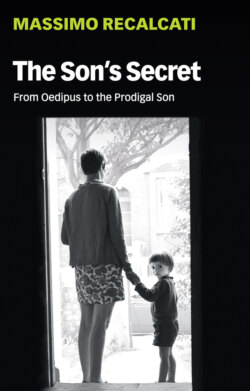The Son's Secret

Реклама. ООО «ЛитРес», ИНН: 7719571260.
Оглавление
Massimo Recalcati. The Son's Secret
CONTENTS
Guide
Pages
Dedication
The Son’s Secret. From Oedipus to the Prodigal Son
Introduction
Notes
1 Oedipus: The Son of Guilt
The Child’s Condition
The Word and Language
The Slave-Messenger
Oedipus, The Son
The Innocent-Guilty
Infanticide
Violence Without Law
A Tragedy of Light
Nemesis
‘You Are The Curse, The Corruption Of This Land’
Oedipus and Hamlet
Descending into the Grave
How Much Truth Can One Man Bear?
Notes
2 The Prodigal Son
The Rain
Another Son to Bend the Law of Destiny
The Parable of the Prodigal Son
‘Give Me My Share of the Estate!’
A Bad Interpretation of the Law
Isaac the Son
The Father’s Gift and the Celebration of Rediscovery
The Son’s Return
The Chance For a New Life
Rembrandt’s Portrait
The Rightful Son
Freud on the Acropolis
The Resurrection of Life
The Scar that Becomes a Poem
Notes
Epilogue
Notes
POLITY END USER LICENSE AGREEMENT
Отрывок из книги
For my son Tommaso, for his life.
Why do you look for the living among the dead? He is not here; he is risen!
.....
Oedipus and the prodigal son demonstrate the oscillation between these two poles in the process of filiation. Oedipus the son is trapped in a symmetrical conflict with his father, with no hope of resolution. Infanticide and patricide mirror one another. The father of the prodigal son shows instead that he knows how to bear the real that cannot be shared, embodied by the life of his son. He does not respond to his son’s ‘patricidal’ gesture with hate, but chooses to trust him, to not stand in his way. He shows that, unlike Laius, he does not fear his son’s absolute secret but loves it deeply. In his father’s gesture of forgiveness, the warm welcome he extends upon his son’s return, the prodigal son finds a dissymmetry that breaks with any understanding of the Law as an inexorable destiny or punishment, the very thing that crushes Oedipus’ life. This father is able to recognize the enigma of the prodigal son without demanding to solve it. He offers himself as a Law whose foundations do not lie in any Code but only in the act of forgiveness itself, as the highest possible form of the Law, as the freedom of the Law. This is what the son learns for himself: it is not humankind that is made for the Law but the Law that is made for humankind.4
The son embodies the unsharable difference of life and its limitless strength. He resists any possible empathetic identification. He moves through the world carrying with him not only the irreducible difference of his own generation from that of his parents, but also the most elusive detail of his own existence. The greatest gift given to the son by the father in Luke’s parable is that of freedom, which is the greatest gift any parent can give their child. The father does not demand dialogue or reciprocal comprehension, but recognizes the son’s desire as an indecipherable enigma. Is this indecipherability not constantly experienced by every parent? Does love as an absolute openness to the mystery of the child’s otherness not arise precisely from this? Does respect for the child’s secret not perhaps indicate how being a parent is never an experience of acquisition or appropriation, but of decentralization of the self? Love is not empathetic. It is not based on reciprocal understanding, on sharing, but is respect for the absolute secret of the Other, for their solitude. Love is founded on the distance of difference, on that which cannot be shared, on the real of the Two that cannot be assimilated. This is not only the case for the bond between parents and their children, but even more so in every other relationship. Psychoanalysis allows us to see how those lasting loving relationships capable of being generative are the ones that never dissolve the enigma of the Other, the ones that know how to maintain the Other’s absolute secret that is impossible to comprehend. Only on the basis of this solitude, of this enigma that each person is and must remain for the Other (as well as for themselves) can a relationship with the Other, a being together with the Other, occur.
.....